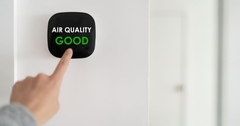
In the pursuit of a healthier lifestyle, many people focus on diet, exercise, and stress management but often overlook the significance of indoor air quality. Mold and unpleasant odors detract from the comfort and aesthetics of living spaces and pose serious health risks. In this blog post, we'll explore how mold and odor removal can significantly improve your well-being, creating a healthier environment for you and your loved ones to thrive in.
Understanding the Health Risks of Mold and Odors
Mold Exposure
Mold is a type of fungus that thrives in damp, humid environments and can grow on various surfaces, including walls, ceilings, floors, and furnishings. Exposure to mold spores, whether through inhalation, skin contact, or ingestion, can trigger allergic reactions, respiratory problems, and exacerbate existing health conditions such as asthma or allergies. Prolonged exposure to mold may also lead to more severe health issues, including fungal infections and respiratory illnesses.
Odor Pollution
Unpleasant odors in the home, whether from cooking, pets, tobacco smoke, or household chemicals, not only affect indoor air quality but can also impact our physical and emotional well-being. Lingering odors can cause discomfort, headaches, nausea, and irritate the respiratory system, leading to respiratory symptoms such as coughing, sneezing, and throat irritation. Additionally, persistent odors can affect mood, concentration, and overall quality of life, creating a less desirable living environment.
The Benefits of Mold and Odor Removal
Improved Indoor Air Quality
Mold and odors are indicators of poor indoor air quality, which can have a significant impact on respiratory health and overall well-being. By eliminating mold spores and neutralizing unpleasant odors, homeowners can improve indoor air quality and create a healthier living environment for themselves and their families. Clean, fresh air promotes respiratory health, reduces the risk of allergies and asthma attacks, and enhances overall comfort and well-being.
Reduced Health Risks
Mold removal is essential for mitigating health risks associated with mold exposure, including allergic reactions, respiratory problems, and other adverse health effects. By addressing mold growth promptly and thoroughly, homeowners can minimize the risk of mold-related health issues and create a safer living environment for occupants, particularly those with respiratory conditions or compromised immune systems. Similarly, eliminating odors reduces the risk of respiratory irritation and discomfort, improving overall health and quality of life.
Prevention of Structural Damage
Mold growth not only poses health risks but can also cause significant structural damage to buildings and furnishings. Mold can deteriorate building materials, such as drywall, wood, and insulation, compromising the integrity of the structure and leading to costly repairs or renovations. By removing mold promptly and addressing underlying moisture issues, homeowners can prevent structural damage and prolong the lifespan of their homes.
Enhanced Comfort and Well-Being
A clean, odor-free home promotes a sense of comfort, well-being, and relaxation for occupants. By eliminating unpleasant odors and creating a fresh, inviting environment, homeowners can enhance their quality of life and enjoy a more pleasant living experience. Improved indoor air quality also contributes to better sleep, increased productivity, and reduced stress levels, fostering a healthier and happier lifestyle.
Methods of Mold and Odor Removal
Professional Remediation Services
For extensive mold infestations or persistent odors, professional remediation services may be necessary. Certified mold remediation professionals have the expertise, equipment, and resources to assess the extent of mold growth, remove mold safely and effectively, and address underlying moisture issues to prevent recurrence.
Air Purification Systems
Air purifiers equipped with HEPA filters and activated carbon can help remove mold spores, allergens, and odors from indoor air, improving air quality and reducing respiratory symptoms. These systems filter out airborne contaminants and neutralize odors, creating a cleaner, healthier environment for occupants.
Cleaning and Ventilation
Regular cleaning, proper ventilation, and moisture control are essential for preventing mold growth and eliminating odors in the home. Cleaning surfaces with mold-resistant products, improving ventilation in damp areas such as bathrooms and kitchens, and using dehumidifiers to reduce humidity levels can help prevent mold and odor problems before they arise.
In conclusion, mold and odor removal play a crucial role in creating a healthier living environment and promoting overall well-being. By addressing indoor air quality issues, homeowners can reduce health risks, prevent structural damage, and enhance comfort and quality of life for themselves and their families. Whether through professional remediation services, air purification systems, or proactive cleaning and maintenance practices, investing in mold and odor removal is an investment in healthier, happier living.